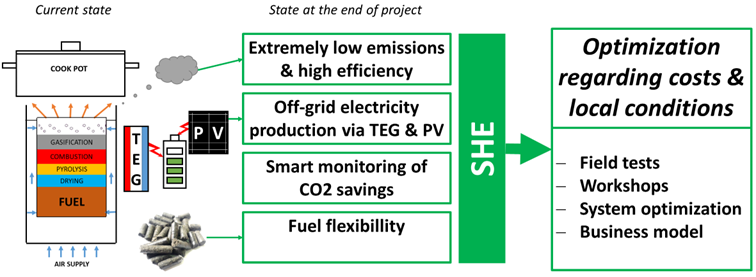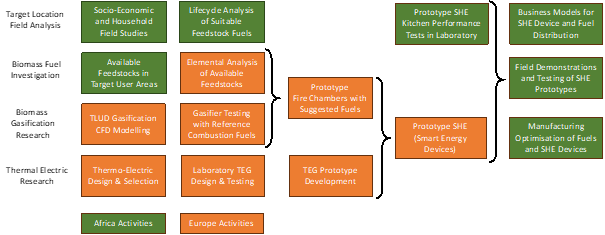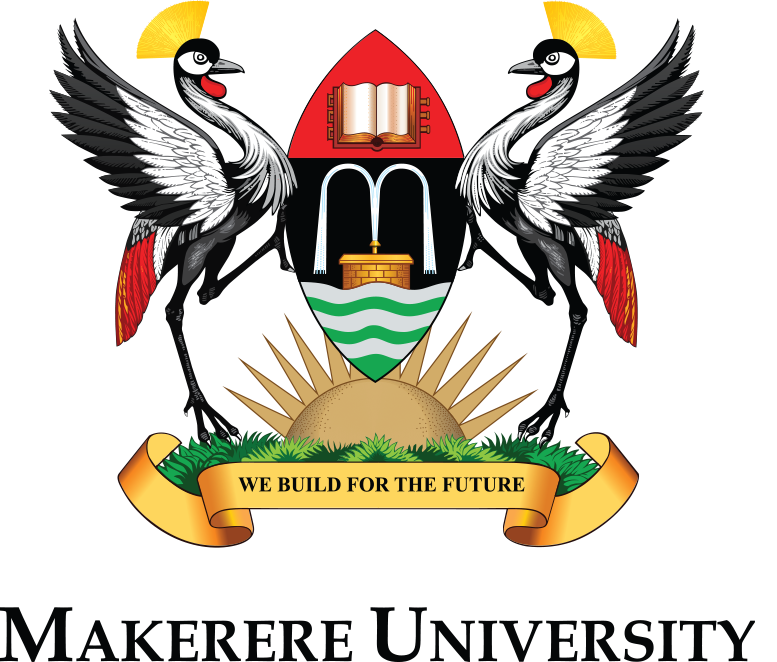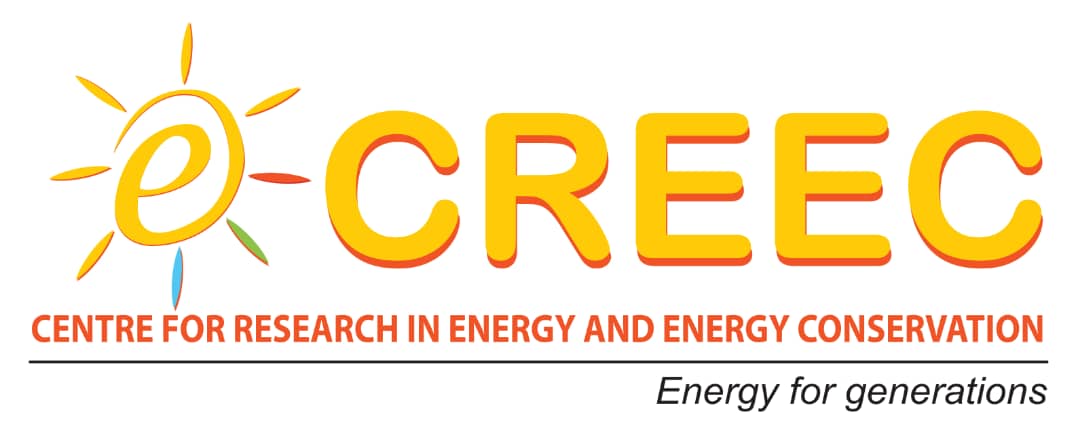Location:
Europe: Austria, France and Spain: Laboratory testing of combustion materials and equipment for the scientific technology development in the is carried out in
Africa: South Africa and Uganda: Field tests, socio-economic studies, workshops and training to adapt the implementation of the technology and adjust the designs to suit a local user needs and requirements.
Coordinator/s of the project:
Main Coordinator: Graz University of Technology, represented by the Institute of Thermal Engineering (TUG), Robert Scharler
Africa Coordinator: EKASI Energy, Dave Lello
Partners list :
- Graz University of Technology (TUG) – Austria
- Carbon Compass (CC) – Austria
- Institut Mines Telecom (IMT Mines Albi) – France
- EKASI Energy (EE) – South Africa
- Tshwane University of Technology (TUT) – South Africa
- Makerere University (MAK) – Uganda
- Associated partner: University Carlos III de Madrid (UC3M) – Spain
- Associated partner: Centre for Research in Energy and Energy Conservation – Uganda
Overall Objectives
The project aims to develop the unique Smart Home Energy (SHE) technology and demonstrate its effectiveness and impact on users in four rural communities in two countries (South Africa and Uganda). This will make a significant contribution to the UN Sustainable Development Goal 7 (SDG7), aiming to ensure access to affordable, reliable, sustainable and modern energy for all by 2030.
The SHE device will be based on the currently available best performing cookstove regarding CO emissions for wood pellets, successfully developed in a previous project by Ekasi Energy (EE) together with TU Graz (TUG) using a combined experimental approach and extensive CFD analyses.

Overview of the project objectives on the integration of SHE components
- Expansion of the cookstove for cheap agricultural residues and perennial crops, pressed into pellets or briquettes as an affordable and readily available fuel. SHE will be able to burn locally available and cheap agro-fuels instead of valuable wood resources in a way that meets WHO cooking standards. The thermal efficiency has a target value of > 40 % to reduce fuel demands and costs.
- Integration of a Thermal Electric Generator (TEG) into the SHE device with an interface to a battery and a solar panel to extend its functionality for mobile electricity production to enable off-grid operation as well as to power mobile devices and lights.
- Performance of a techno-economic analysis regarding an optimized integration of the power production and storage unit with TEG, PV, battery and to define an optimum configuration of available PV panels and batteries.
- Integrating a smart carbon tracking system without costly sensors in the stove to make SHE affordable. It includes a database of relevant operational data for relevant fuels, as well as an algorithm that allows fuel suppliers to calculate fossil energy and CO2 savings based only on the amount of fuel they sell.
- Adapting the SHE device to local conditions through field studies, socio-economic studies and the development of a fuel supply chain concept with decentralized fuel production and treatment solutions tailored to the target communities. Based on this, a business model will be developed to eventually provide a smart and affordable low-tech solution to successfully introduce SHE to the target markets.
Context: why is this action necessary?
More than 45% of Africa’s population lives in isolated rural communities. Rural energy needs have been met by biomass for many centuries, albeit in a traditional way, which is associated with high per capita fuel use / low thermal efficiency, health risks (smoke inhalation and fire risks), and natural deforestation due to the use of harvested wood as the primary fuel. Around 2.8 billion people still cook with traditional polluting technologies and fuels, and another 1.25 billion are considered in transition with some access to clean, efficient, convenient, safe, reliable, and affordable cooking energy.
In Sub-Saharan Africa the rate of access to modern sources of energy for cooking stands at 10%. Cooking on open fires or inefficient stoves harm the people’s health (mostly women and children), the climate, and the environment. Inefficient combustion of solid fuels and kerosene over open fires and inefficient stoves produces a range pollutants and releases greenhouse gases (GHGs) like carbon dioxide (CO2) and short-lived climate pollutants (SLCPs).
Some 275 million people live in “hot spots” of unsustainable wood fuel depletion, mainly in the tropical forest areas of South Asia and East Africa. Of these, nearly 60% live in Asia, 34% in Africa, and 6% in Latin America. In 12 nations including Uganda — emissions from wood fuels are estimated to account for more than 50% of the country’s total emissions. Using agricultural residues instead of wood reduces the reliance on forest harvesting, increases the application potential of the SHE, and results in decreasing deforestation and mitigating climate change.
In addition, over 70% of rural areas in Africa do not have adequate access to electricity. In addition, according to the IEA, about 600 million people in sub-Saharan Africa did not have access to electricity in 2021 and over 70% in the rural areas have no sufficient access to electricity. Therefore, there is an urgent need for an affordable smart energy device that can provide electricity and cook/heat to support grid independence and self-sufficiency.
What are the concrete actions that will be implemented?
For the development, validation and demonstration of SHE, a multi-stage approach is followed:
A multi-fuel cookstove with extremely low emissions, a thermal efficiency >40% and an integrated TEG for electricity generation will be developed through laboratory experiments and dedicated CFD simulations. In addition, the thermoelectric generator is included in the concept.

Investigations will be carried out on relevant African feedstocks, including a subsequent further detailed analysis and adaptation of the fuel supply chain under local conditions. A detailed characterization of the relevant fuels will be performed including analyses of fuel pre-treatment as well as investigating the possibility of fuel blending for selected fuels. This work includes also investigations of the carbon and mineral cycle of these fuels.
In addition, a comprehensive experimental analysis of the stove’s performance in terms of multi-fuel operation will be carried out together with detailed emission measurements and electricity generation. The work will also include a study on the integration of the electricity generation unit, which will additionally include a PV panel together with a battery.
Based on the experiments, a database and algorithm will be created to determine carbon savings based on mass and energy balances with the experimental data as a function of fuel consumption.
The technology will be adapted to local requirements, accompanied by field studies to verify and demonstrate the SHE technology under real conditions. This includes validation and optimization of the carbon tracking method using the experimental data from the field tests.
Studies on gender and health aspects as well as on the application of SHE in rural or refugee areas will be performed. A business model will be developed to make the technology affordable and available to the target groups. Based on this, a socio-techno-economic analysis and optimization of the SHE technology will be carried out.
To stimulate wide acceptance and dissemination of SHE, activities will include participation in conferences and the organisation of on-site trainings and workshops in Africa.
What is the expected impact of the project?
The project will develop a unique Smart Home Energy Device (SHE) to solve the major domestic energy problems faced by rural people and refugees in Africa. SHE will be an integrated solution that, for the first time in the world, will meet both cooking and electricity needs in a small household.

The impact of the integrated technologies in the Smart Home Energy Device will result in the following benefits for the communities adopting its use:
- Independent renewable fuel production from local resources that generate revenue for the participants. In addition, pressed fuels would be more readily available due to their easier transportability, which is a major advantage for remote rural areas.
- Reduced (woody) fuel needs with a reduced carbon footprint and a reduction of deforestation: according to the World Biomass Association (WBA), 4 million hectares of forest are destroyed in Africa every year, and charcoal production is a major cause of deforestation in Africa.
- Minimized health risks normally associated with biomass fuels due to the extremely low obtained CO emissions of SHE (< 0.3 g/MJd), which would be one order of magnitude lower than the value required for the highest Tier, i.e. Tier 5 (< 3 g/MJd).
- Better gender equality: Studies show that time poverty due to unpaid domestic work is a major barrier to women’s empowerment and broader economic development. Cooking and fuel collection are key components of unpaid work and thus must be addressed if we are to reach SDG 5 (achieve gender equality and empower all women and girls). Providing women access to modern energy is a critical but often overlooked means of empowering women at a household level and advancing gender equality.
- The hybrid approach for electricity generation from two sources that complement each other, i.e. TEG and solar panel, allows to generate power with the TEG when the sun is not shining or during the day without burning valuable fuel with the solar panel. Moreover, thanks to a built-in battery, power is always available, even for emergency use.
- Carbon Credits: The tracking of saved fuel and CO2 emissions is based on an intelligent low-tech method that includes a database of relevant operating data and a calculation algorithm. This enables carbon tracking just by knowing the type and amount of fuel consumed, without the need for expensive sensors and WiFi, to enable widespread application of the technology by even the poorest sections of the population.








